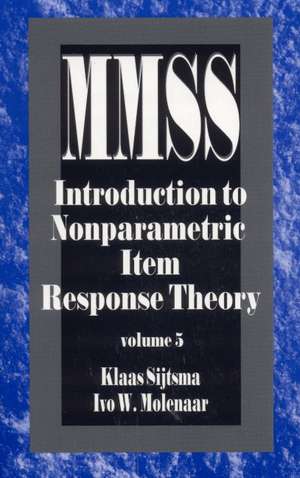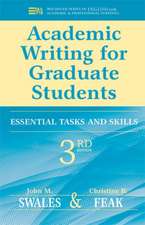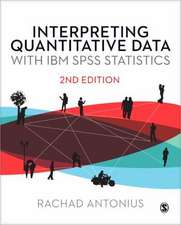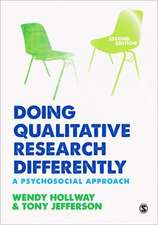Introduction to Nonparametric Item Response Theory: Measurement Methods for the Social Science, cartea 5
Autor Klaas Sijtsma, Ivo W. Molenaaren Limba Engleză Paperback – 6 mai 2002
| Toate formatele și edițiile | Preț | Express |
|---|---|---|
| Paperback (1) | 548.39 lei 6-8 săpt. | +26.15 lei 4-10 zile |
| SAGE Publications – 6 mai 2002 | 548.39 lei 6-8 săpt. | +26.15 lei 4-10 zile |
| Hardback (1) | 918.98 lei 6-8 săpt. | |
| SAGE Publications – 6 mai 2002 | 918.98 lei 6-8 săpt. |
Preț: 548.39 lei
Preț vechi: 645.17 lei
-15% Nou
Puncte Express: 823
Preț estimativ în valută:
104.94€ • 109.84$ • 87.34£
104.94€ • 109.84$ • 87.34£
Carte tipărită la comandă
Livrare economică 31 martie-14 aprilie
Livrare express 21-27 februarie pentru 36.14 lei
Preluare comenzi: 021 569.72.76
Specificații
ISBN-13: 9780761908135
ISBN-10: 0761908137
Pagini: 176
Ilustrații: Illustrations
Dimensiuni: 140 x 216 x 10 mm
Greutate: 0.21 kg
Ediția:New.
Editura: SAGE Publications
Colecția Sage Publications, Inc
Seria Measurement Methods for the Social Science
Locul publicării:Thousand Oaks, United States
ISBN-10: 0761908137
Pagini: 176
Ilustrații: Illustrations
Dimensiuni: 140 x 216 x 10 mm
Greutate: 0.21 kg
Ediția:New.
Editura: SAGE Publications
Colecția Sage Publications, Inc
Seria Measurement Methods for the Social Science
Locul publicării:Thousand Oaks, United States
Recenzii
“Introduction to Nonparametric Item Response Theory is an accessible introduction to constructing tests/scales using nonparametric IRT. It should be of great use to social scientists who construct their own measurement instruments, as well as those who provide them statistical support. For those who focus on larger scale standardized tests, the volume provides a refreshing step back to look at some important issues in the field and some alternative methods of analysis.”
Notă biografică
Vice dean of research Tilburg School of Social and Behavioral Sciences, program director research master, and professor of methodology and statistics
Descriere
This book introduces social and behavioral science students and researchers to the theory and practice of the highly powerful methods of nonparametric item response theory (IRT). Anyone who uses or constructs tests or questionnaires for measuring abilities, achievements, personality traits, attitudes, or opinions will find nonparametric IRT useful for designing and improving such measurements. The authors show how the broadness of the nonparametric item response models allows them to fit many data sets and remain powerful enough for implying useful measurement properties, such as the ordering of persons using the simple total score (number-correct for dichotomous item tests and sum of rating scale score for polytomous item tests) and the ordering of the items using the item means.


















